
I am the head of the group of computer architecture. The main focus of the group is the development and application of CAD tools in circuit design. The research areas range from system descriptions in SystemC over test and verification down to synthesis. For further information see www.rolfdrechsler.de
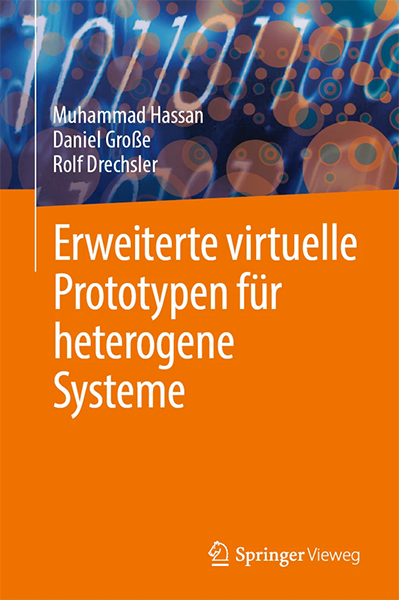 Erweiterte virtuelle Prototypen für heterogene Systeme
Erweiterte virtuelle Prototypen für heterogene Systeme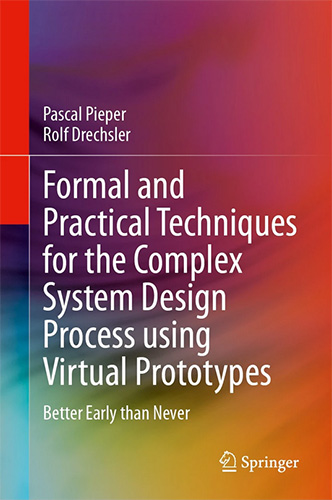 Formal and Practical Techniques for the Complex System Design Process using Virtual Prototypes
Formal and Practical Techniques for the Complex System Design Process using Virtual Prototypes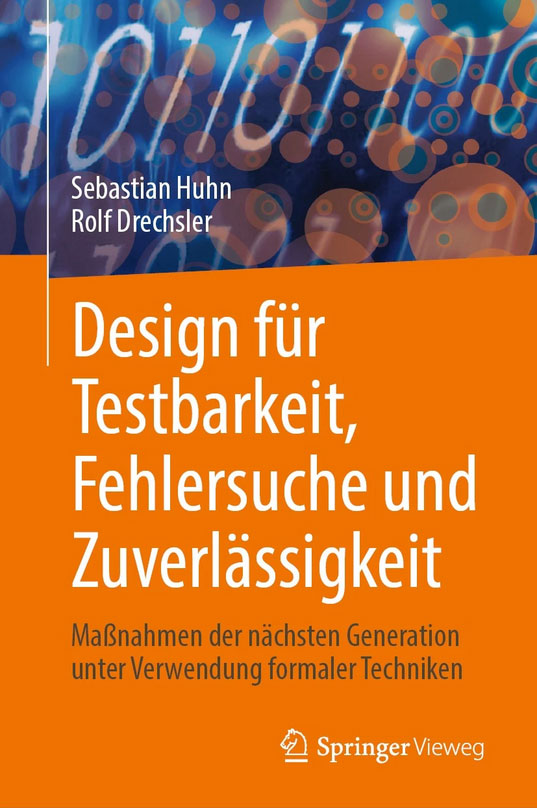 Design für Testbarkeit, Fehlersuche und Zuverlässigkeit
Design für Testbarkeit, Fehlersuche und Zuverlässigkeit Noerdman Comicbuch
Noerdman Comicbuch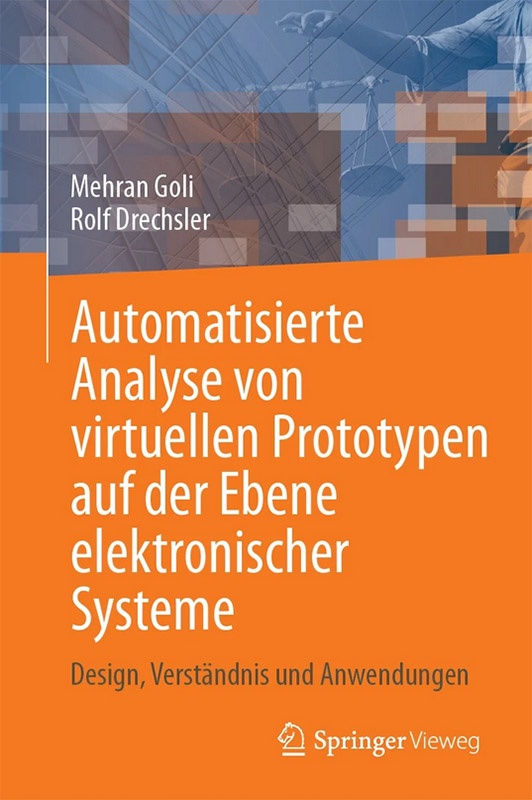 Automatisierte Analyse von virtuellen Prototypen auf der Ebene elektronischer Systeme | Design, Verständnis und Anwendungen
Automatisierte Analyse von virtuellen Prototypen auf der Ebene elektronischer Systeme | Design, Verständnis und Anwendungen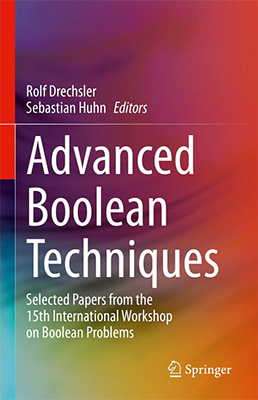 Advanced Boolean Techniques
Advanced Boolean Techniques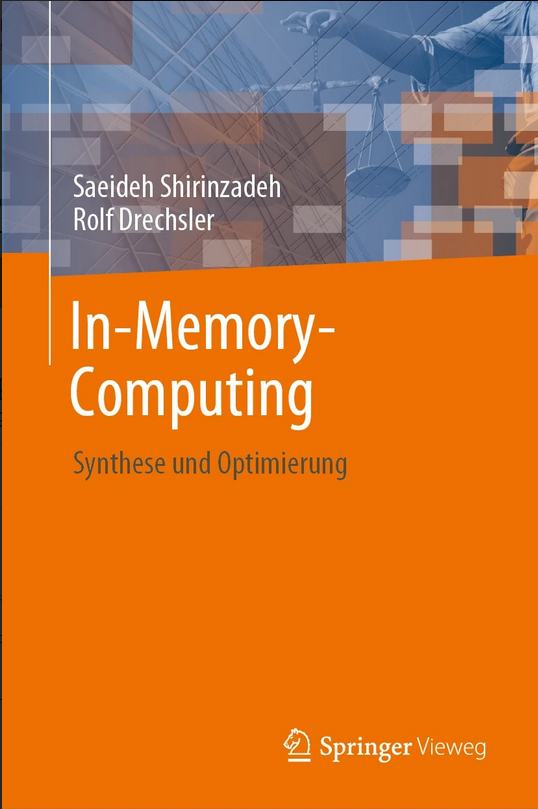 In-Memory-Computing
In-Memory-Computing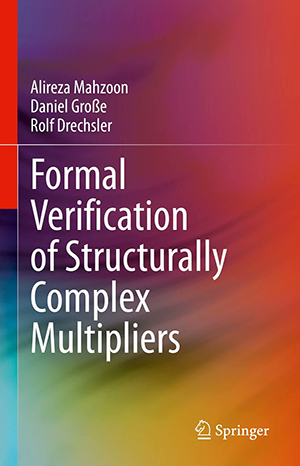 Formal Verification of Structurally Complex Multipliers
Formal Verification of Structurally Complex Multipliers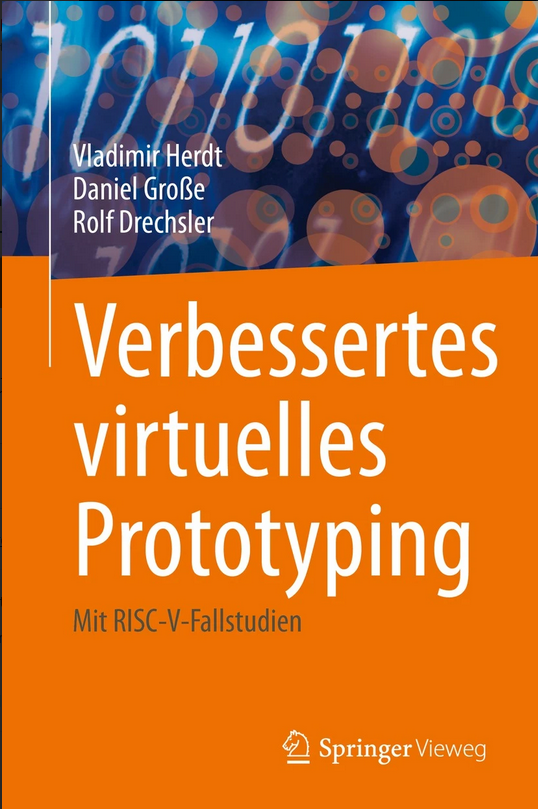 Verbessertes virtuelles Prototyping
Verbessertes virtuelles Prototyping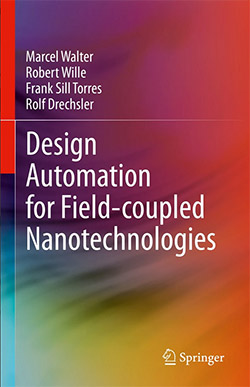 Design Automation for Field-coupled Nanotechnologies
Design Automation for Field-coupled Nanotechnologies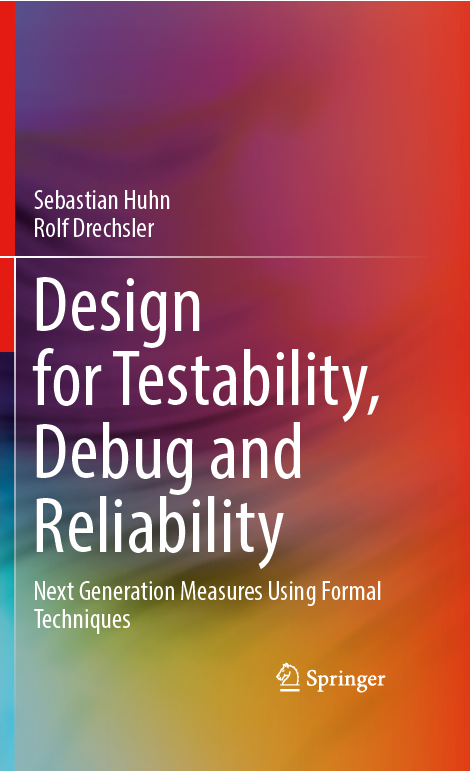 Design for Testability, Debug and Reliability: Next Generation Measures Using Formal Techniques
Design for Testability, Debug and Reliability: Next Generation Measures Using Formal Techniques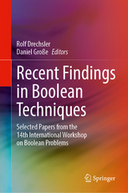 Recent Findings in Boolean Techniques
Recent Findings in Boolean Techniques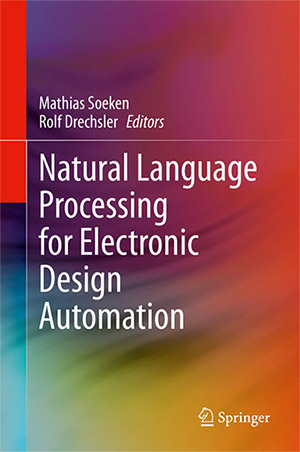 Natural Language Processing for Electronic Design Automation
Natural Language Processing for Electronic Design Automation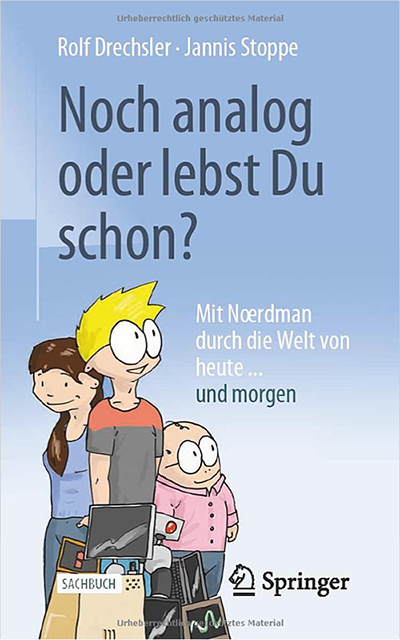 Noch analog oder lebst Du schon?
Noch analog oder lebst Du schon?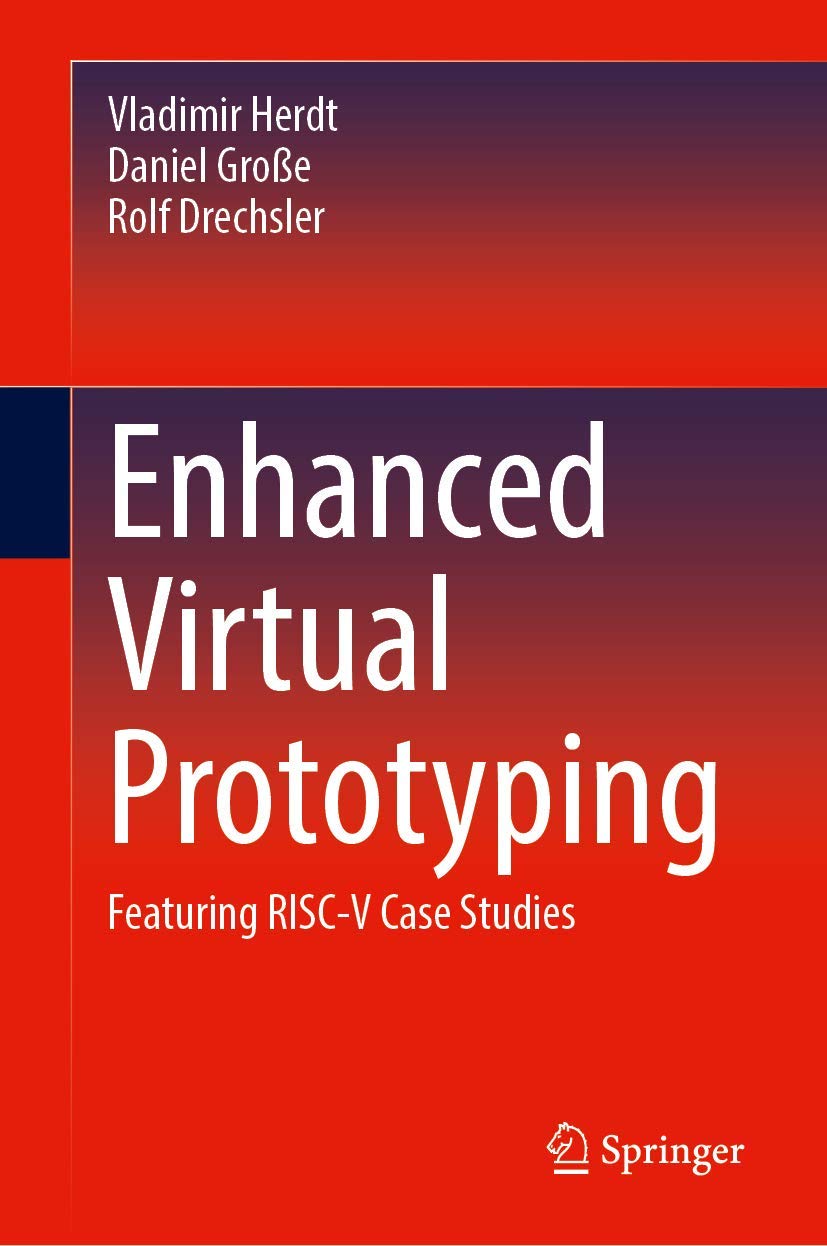 Enhanced Virtual Prototyping: Featuring RISC-V Case Studies
Enhanced Virtual Prototyping: Featuring RISC-V Case Studies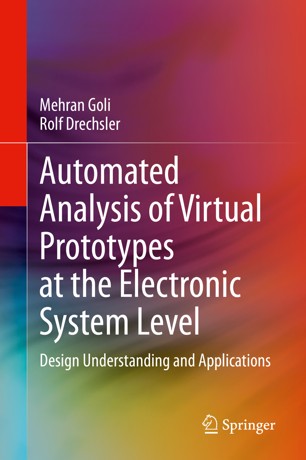 Automated Analysis of Virtual Prototypes at the Electronic System Level – Design Understanding and Applications
Automated Analysis of Virtual Prototypes at the Electronic System Level – Design Understanding and Applications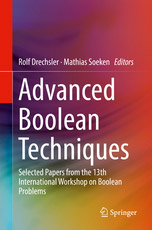 Advanced Boolean Techniques
Advanced Boolean Techniques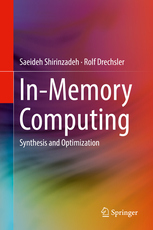 In-Memory Computing -
Synthesis and Optimization
In-Memory Computing -
Synthesis and Optimization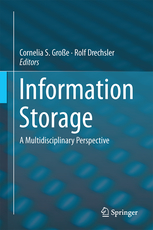 Information Storage - A Multidisciplinary Perspective
Information Storage - A Multidisciplinary Perspective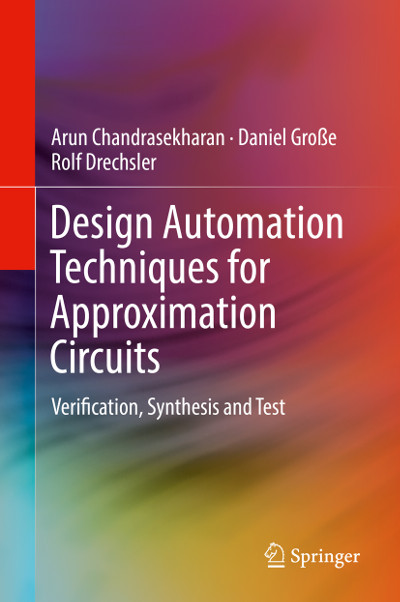 Design Automation Techniques for Approximation Circuits
Design Automation Techniques for Approximation Circuits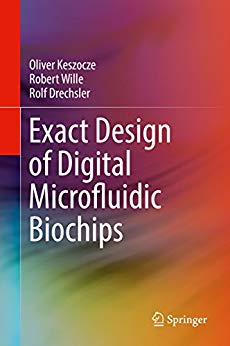 Exact Design of Digital Microfluidic Biochips
Exact Design of Digital Microfluidic Biochips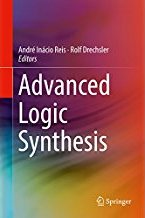 Advanced Logic Synthesis
Advanced Logic Synthesis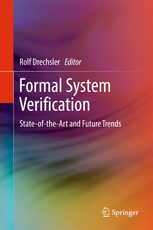 Formal System Verification
State-of the-Art and Future Trends
Formal System Verification
State-of the-Art and Future Trends Computer: Wie funktionieren Smartphone, Tablet & Co.?
Computer: Wie funktionieren Smartphone, Tablet & Co.? Methoden und Beschreibungssprachen zur Modellierung und Verifikation von Schaltungen und Systemen
Methoden und Beschreibungssprachen zur Modellierung und Verifikation von Schaltungen und Systemen Automatic Methods for the Refinement of System Models
Automatic Methods for the Refinement of System Models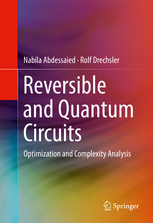 Reversible and Quantum Circuits
Reversible and Quantum Circuits Languages, Design Methods, and Tools for Electronic System Design
Languages, Design Methods, and Tools for Electronic System Design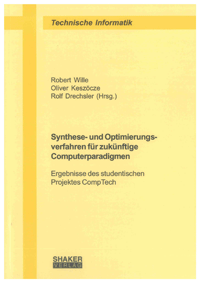 Synthese- und Optimierungsverfahren für zukünftige Computerparadigmen
Synthese- und Optimierungsverfahren für zukünftige Computerparadigmen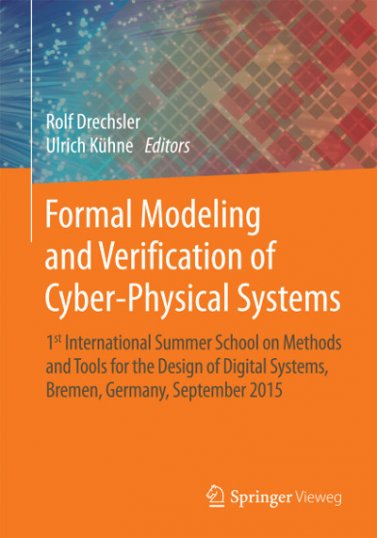 Formal Modeling and Verification of Cyber-Physical Systems
Formal Modeling and Verification of Cyber-Physical Systems Formal Specification Level
Formal Specification Level Aspekte der Technischen Informatik
Aspekte der Technischen Informatik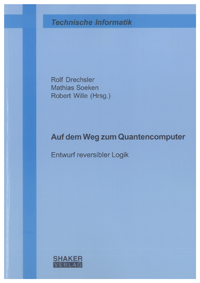 Auf dem Weg zum Quantencomputer - Entwurf reversibler Logik
Auf dem Weg zum Quantencomputer - Entwurf reversibler Logik High Quality Test Pattern Generation and Boolean Satisfiability
High Quality Test Pattern Generation and Boolean Satisfiability Applications of Evolutionary Computation
Applications of Evolutionary Computation Towards a Design Flow for Reversible Logic
Towards a Design Flow for Reversible Logic Debugging at the Electronic System Level
Debugging at the Electronic System Level Quality-Driven SystemC Design
Quality-Driven SystemC Design Test Pattern Generation using Boolean Proof Engines
Test Pattern Generation using Boolean Proof Engines Robustness and Usability in Modern Design Flows
Robustness and Usability in Modern Design Flows  Applications of Evolutionary Computing
Applications of Evolutionary Computing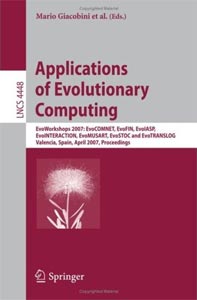 Applications of Evolutionary Computing
Applications of Evolutionary Computing SATRIX - Algorithmen für Boolesche Erfüllbarkeit
SATRIX - Algorithmen für Boolesche Erfüllbarkeit Applications of Evolutionary Computing
Applications of Evolutionary Computing Advanced BDD Optimization
Advanced BDD Optimization Technische Informatik - Eine Einführung
Technische Informatik - Eine Einführung Applications of Evolutionary Computing
Applications of Evolutionary Computing FunTaskIC - Eine integrierte Entwurfsumgebung für SystemC
FunTaskIC - Eine integrierte Entwurfsumgebung für SystemC Applications of Evolutionary Computing
Applications of Evolutionary Computing Advanced Formal Verification
Advanced Formal Verification Methoden und Beschreibungssprachen zur Modellierung und Verifikation von Schaltungen und Systemen
Methoden und Beschreibungssprachen zur Modellierung und Verifikation von Schaltungen und Systemen Evolutionary Algorithms for Embedded System Design
Evolutionary Algorithms for Embedded System Design Software-Engineering und Hardware-Design
Software-Engineering und Hardware-Design Towards One-Pass Synthesis
Towards One-Pass Synthesis Spectral Techniques in VLSI CAD
Spectral Techniques in VLSI CAD Formal Verification of Circuits
Formal Verification of Circuits Evolutionary Algorithms for VLSI CAD
Evolutionary Algorithms for VLSI CAD Binary Decision Diagrams: Theory and Implementations
Binary Decision Diagrams: Theory and Implementations Graphenbasierte Funktionsdarstellung
Graphenbasierte Funktionsdarstellung Functional Decision Diagrams und ihre Anwendung
Functional Decision Diagrams und ihre Anwendung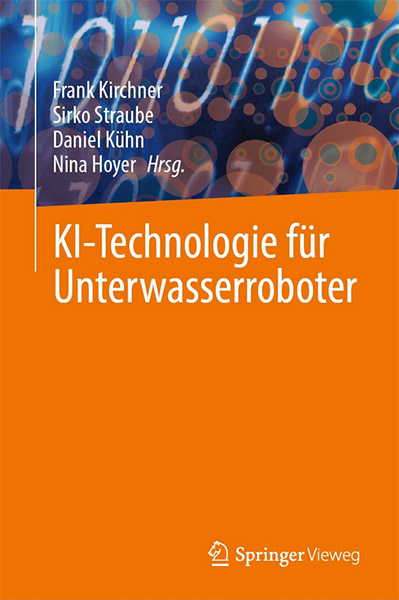 Modulares und rekonfigurierbares Systemdesign für Unterwasserfahrzeuge
Modulares und rekonfigurierbares Systemdesign für Unterwasserfahrzeuge Verifizierung für autonome Unterwassersysteme
Verifizierung für autonome Unterwassersysteme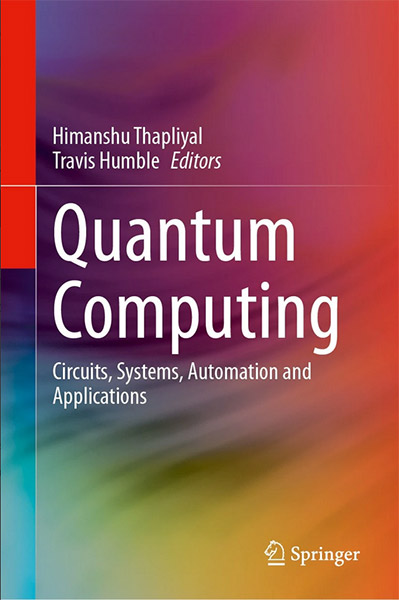 AQuCiDe: Architecture Aware Decomposition of Quantum Circuits
AQuCiDe: Architecture Aware Decomposition of Quantum Circuits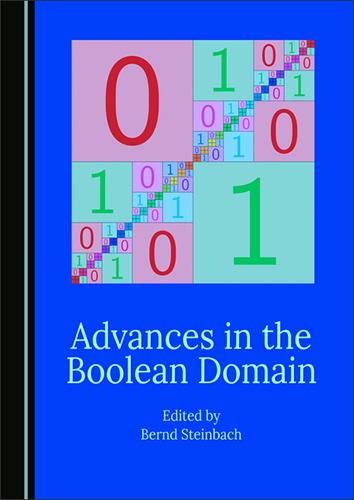 Polynomial Formal Verification of Carry Look-Ahead Adders
Polynomial Formal Verification of Carry Look-Ahead Adders Start Small But Dream Big: On Choosing a Static Variable Order for Multiplier BDDs
Start Small But Dream Big: On Choosing a Static Variable Order for Multiplier BDDs  SAT-Based Key Determination Attack for Improving the Quality Assessment of Logic Locking Mechanisms
SAT-Based Key Determination Attack for Improving the Quality Assessment of Logic Locking Mechanisms Toward System-Level Assertions for Heterogeneous Systems
Toward System-Level Assertions for Heterogeneous Systems Empowering the Design of Reversible and Quantum Logic with Decision Diagrams
Empowering the Design of Reversible and Quantum Logic with Decision Diagrams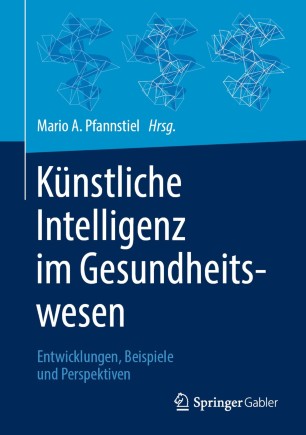 Das Bremen Ambient Assisted Living Lab und darüber hinaus – Intelligente Umgebungen, smarte Services und Künstliche Intelligenz in der Medizin für den Menschen
Das Bremen Ambient Assisted Living Lab und darüber hinaus – Intelligente Umgebungen, smarte Services und Künstliche Intelligenz in der Medizin für den Menschen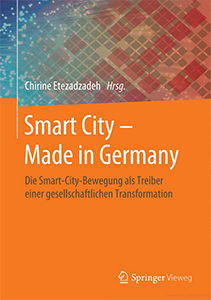 Intelligent Umgeben: Ausgewählte Einblicke in 10 Jahre Bremen Ambient Assisted Living Lab
Intelligent Umgeben: Ausgewählte Einblicke in 10 Jahre Bremen Ambient Assisted Living Lab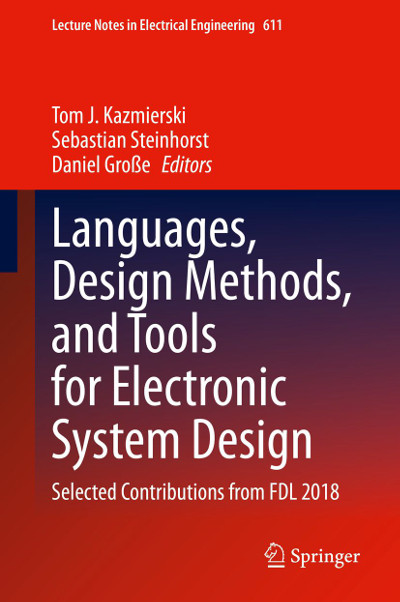 Automatic Design of Microfluidic
Devices: An Overview of Platforms
and Corresponding Design Tasks
Automatic Design of Microfluidic
Devices: An Overview of Platforms
and Corresponding Design Tasks Extensible and Configurable RISC-V Based Virtual Prototype
Extensible and Configurable RISC-V Based Virtual Prototype Approximate Memory: Data Storage in the Context of Approximate Computing
Approximate Memory: Data Storage in the Context of Approximate Computing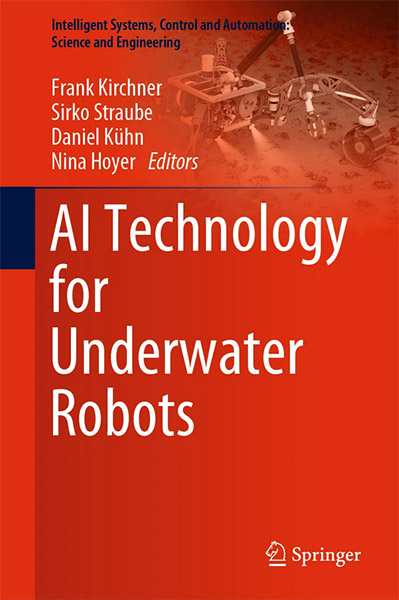 Modular and Reconfigurable System Design for Underwater Vehicles
Modular and Reconfigurable System Design for Underwater Vehicles Verification for Autonomous Underwater Systems
Verification for Autonomous Underwater Systems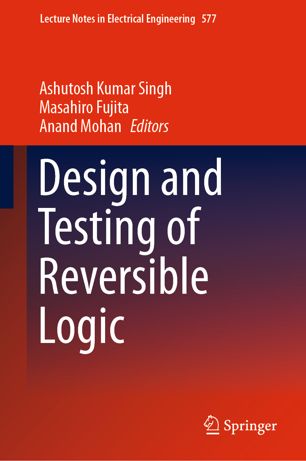 An Efficient Nearest Neighbor Design for 2D Quantum Circuits
An Efficient Nearest Neighbor Design for 2D Quantum Circuits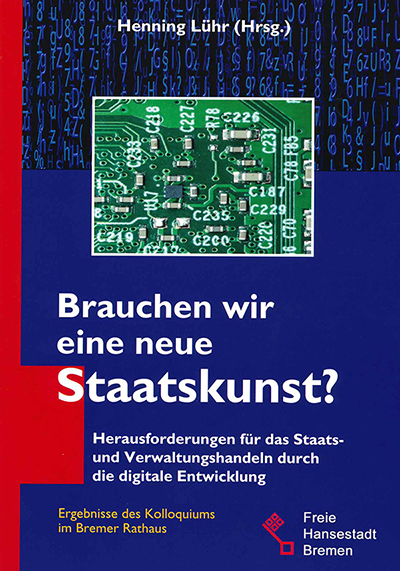 Assistenzsysteme der Zukunft – Nutzen und Potenzial künstlicher Intelligenz
Assistenzsysteme der Zukunft – Nutzen und Potenzial künstlicher Intelligenz In-Memory Computing:
The Integration of Storage and Processing
In-Memory Computing:
The Integration of Storage and Processing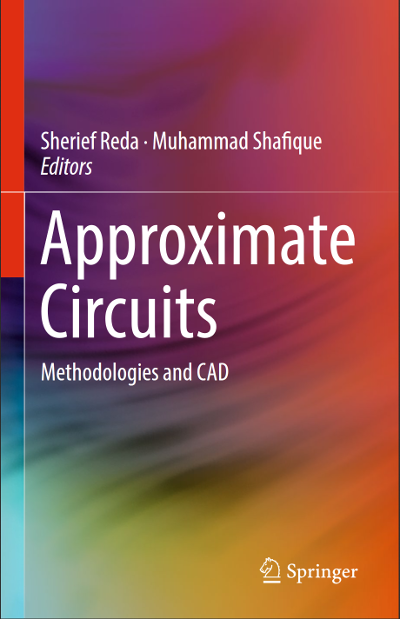 Approximate Hardware Generation Using Formal Techniques
Approximate Hardware Generation Using Formal Techniques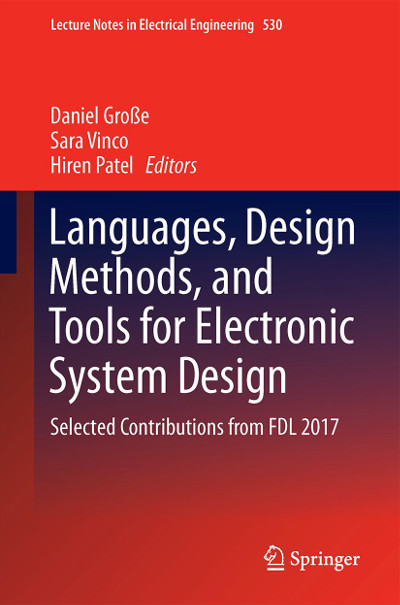 Towards Early Validation of Firmware-Based Power Management Using Virtual Prototypes: A Constrained Random Approach
Towards Early Validation of Firmware-Based Power Management Using Virtual Prototypes: A Constrained Random Approach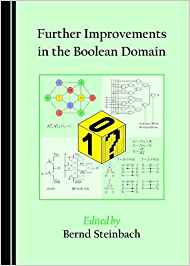 Computational Complexity of Error Metrics in Approximate Computing
Computational Complexity of Error Metrics in Approximate Computing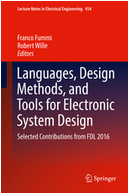 On the Application of Formal Fault Localization to Automated RTL-to-TLM Fault Correspondence Analysis for Fast and Accurate VP-Based Error Effect Simulation: A Case Study
On the Application of Formal Fault Localization to Automated RTL-to-TLM Fault Correspondence Analysis for Fast and Accurate VP-Based Error Effect Simulation: A Case Study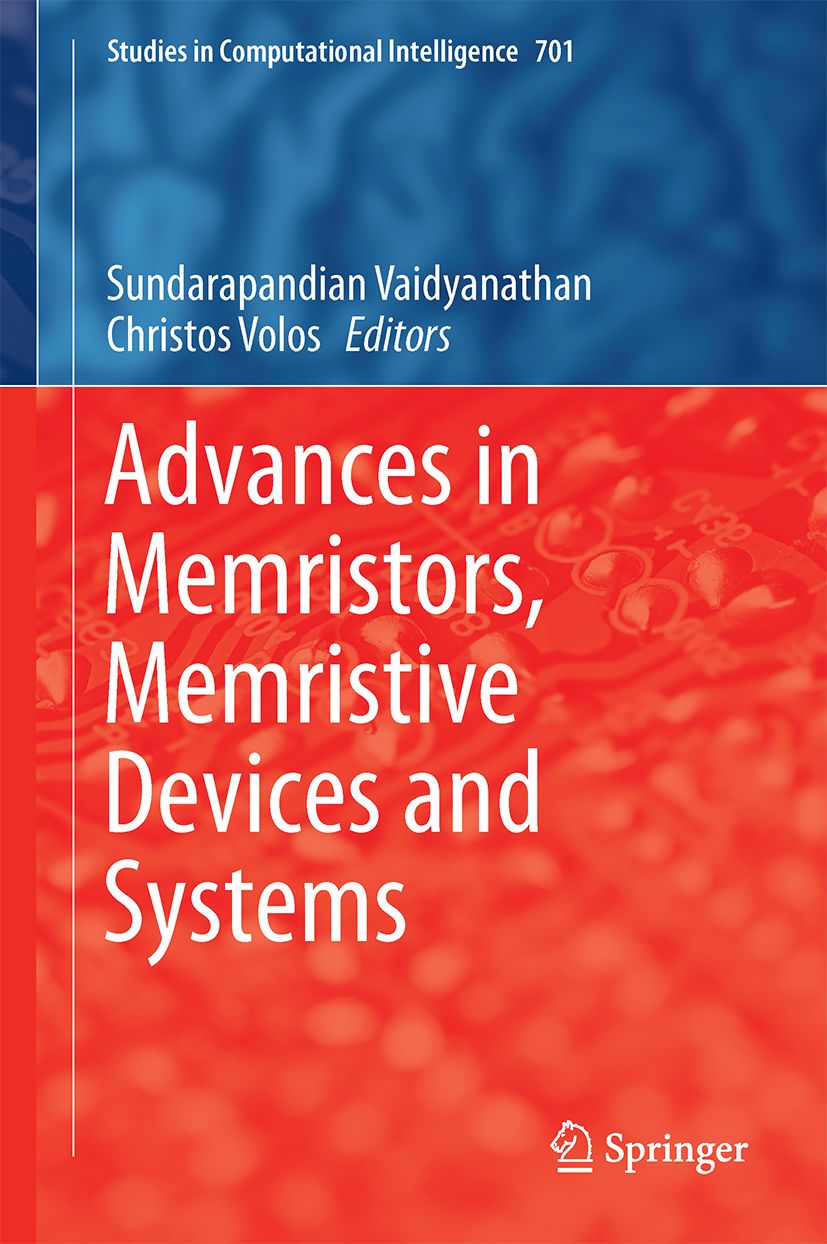 Logic Synthesis for Majority based In-Memory Computing
Logic Synthesis for Majority based In-Memory Computing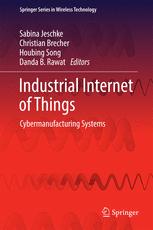 Formal Verification of SystemC-based Cyber Components
Formal Verification of SystemC-based Cyber Components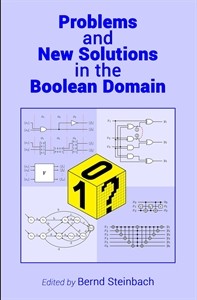 A framework for reversible circuit complexity
A framework for reversible circuit complexity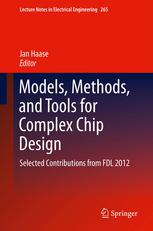 Formal Specification Level
Formal Specification Level SyReC: A Programming Language for Synthesis of Reversible Circuits
SyReC: A Programming Language for Synthesis of Reversible Circuits Enhanced Formal Verification Flow for Circuits Integrating Debugging and Coverage Analysis
Enhanced Formal Verification Flow for Circuits Integrating Debugging and Coverage Analysis SMT-based Stimuli Generation in the SystemC Verification Library
SMT-based Stimuli Generation in the SystemC Verification Library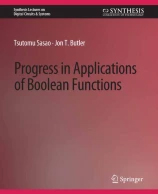 Synthesis of Boolean Functions in Reversible Logic
Synthesis of Boolean Functions in Reversible Logic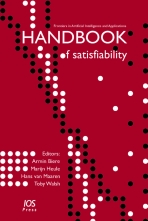 Non-Clausal SAT and ATPG
Non-Clausal SAT and ATPG Debugging Contradictory Constraints in Constraint-based Random Simulation
Debugging Contradictory Constraints in Constraint-based Random Simulation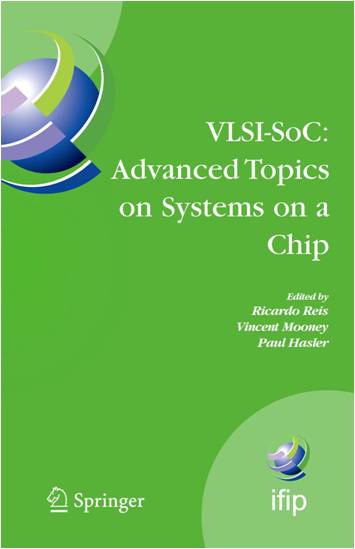 SWORD: A SAT like Prover Using Word Level Information
SWORD: A SAT like Prover Using Word Level Information An Integrated SystemC Debugging Environment
An Integrated SystemC Debugging Environment Measuring the Quality of a SystemC Testbench by using Code Coverage Techniques
Measuring the Quality of a SystemC Testbench by using Code Coverage Techniques Exact BDD Minimization for Path-Related Objective Functions
Exact BDD Minimization for Path-Related Objective Functions Stuck-At-Fault Testability of SPP Three-Level Logic Forms
Stuck-At-Fault Testability of SPP Three-Level Logic Forms Exploration of Sequential Depth by Evolutionary Algorithms
Exploration of Sequential Depth by Evolutionary Algorithms Processor Verification
Processor Verification Automatic Test Pattern Generation
Automatic Test Pattern Generation System-level validation using formal techniques
System-level validation using formal techniques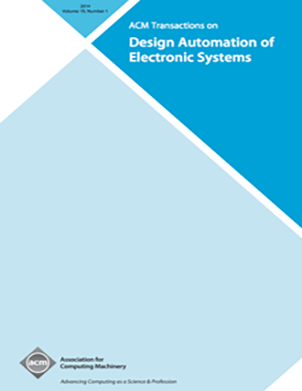 ConfiBench: Automatic Testbench Generation with Confidence-Based Scenario Mask and Testbench Ensemble using LLMs for HDL Design
ConfiBench: Automatic Testbench Generation with Confidence-Based Scenario Mask and Testbench Ensemble using LLMs for HDL Design Comparing Methods for the Cross-Level Verification of SystemC Peripherals with Symbolic Execution
Comparing Methods for the Cross-Level Verification of SystemC Peripherals with Symbolic Execution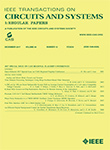 Polynomial Debugging and Fault Correction of Combinational Circuits With Constant Cutwidth
Polynomial Debugging and Fault Correction of Combinational Circuits With Constant Cutwidth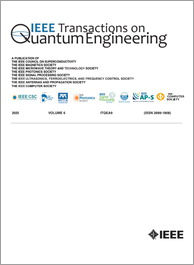 Exploration of Design Alternatives for Reducing Idle Time in Shor’s Algorithm: A Study on Monolithic and Distributed Quantum Systems
Exploration of Design Alternatives for Reducing Idle Time in Shor’s Algorithm: A Study on Monolithic and Distributed Quantum Systems Advanced And-Inverter Graph Decomposition Technique for Reducing Circuit Complexity
Advanced And-Inverter Graph Decomposition Technique for Reducing Circuit Complexity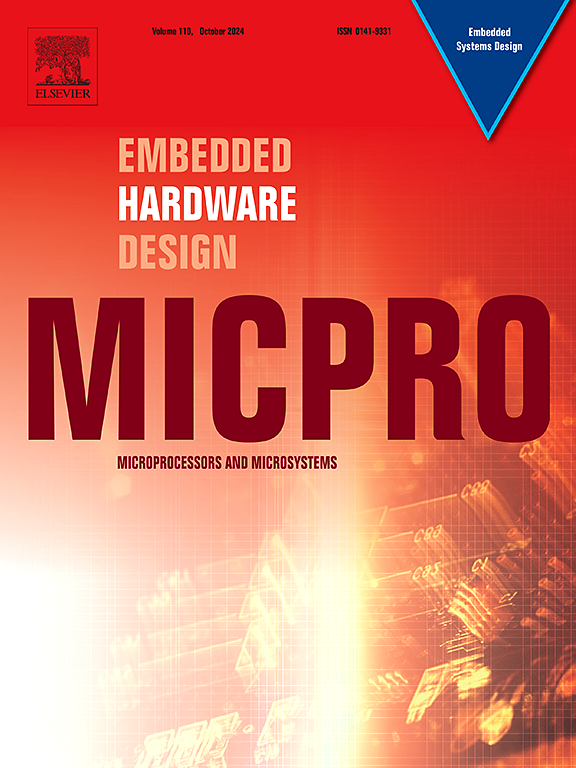 Polynomial formal verification parameterized by cutwidth properties of a circuit using Boolean satisfiability
Polynomial formal verification parameterized by cutwidth properties of a circuit using Boolean satisfiability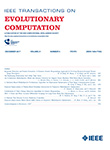 Efficient Evolution of Variable Ordering for Binary Decision Diagram Optimization
Efficient Evolution of Variable Ordering for Binary Decision Diagram Optimization veriSiM: Formal Verification of Spice Netlists for MAGIC-Based Logic-in-Memory
veriSiM: Formal Verification of Spice Netlists for MAGIC-Based Logic-in-Memory LLM-assisted Bug Identification and Correction for Verilog HDL
LLM-assisted Bug Identification and Correction for Verilog HDL FV-LIDAC: Formally Verified Library of Input Data Aware Approximate Arithmetic Circuits
FV-LIDAC: Formally Verified Library of Input Data Aware Approximate Arithmetic Circuits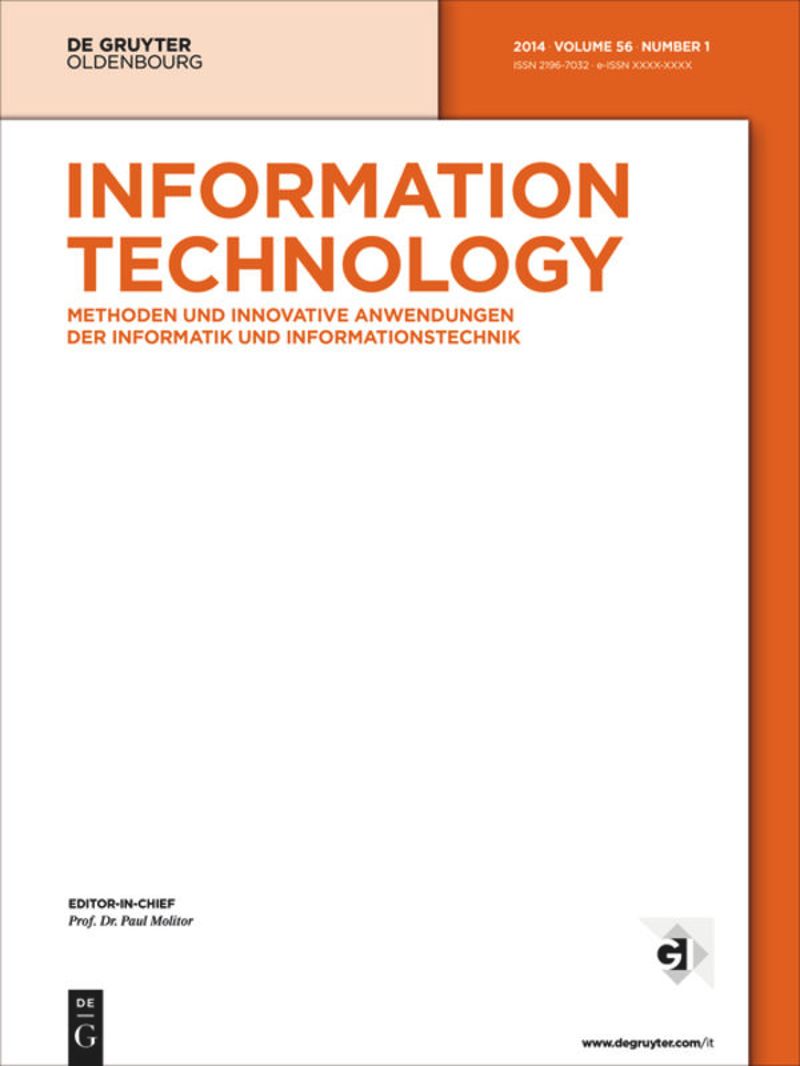 Why less is sometimes more: Using Boolean literals to solve 2048
Why less is sometimes more: Using Boolean literals to solve 2048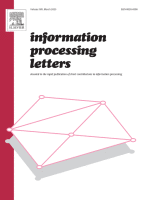 Lower bound proof for the size of BDDs representing a shifted addition
Lower bound proof for the size of BDDs representing a shifted addition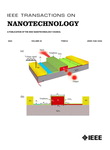 Polynomial Formal Verification of a RISC-V Processor
Polynomial Formal Verification of a RISC-V Processor MESSI: Task Mapping and Scheduling Strategy for FPGA-based Heterogeneous Real-Time Systems
MESSI: Task Mapping and Scheduling Strategy for FPGA-based Heterogeneous Real-Time Systems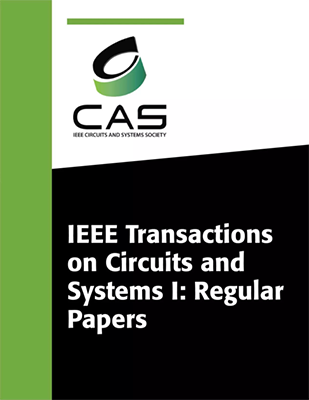 Polynomial Formal Verification of Multi-Valued Approximate Circuits within Constant Cutwidth
Polynomial Formal Verification of Multi-Valued Approximate Circuits within Constant Cutwidth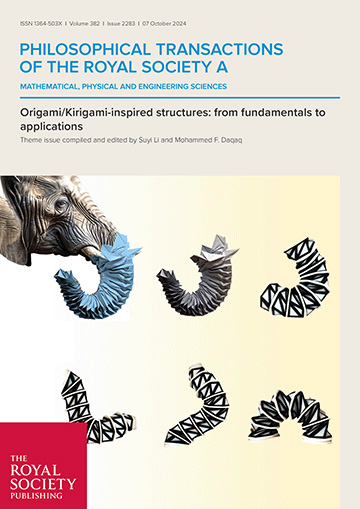 Automated polynomial formal verification using generalized binary decision diagram patterns
Automated polynomial formal verification using generalized binary decision diagram patterns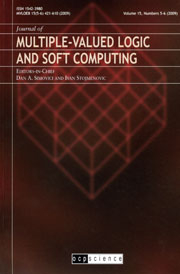 Linear Formal Verification of Multi-Valued Logic Circuits within Constant Cutwidth Architectures
Linear Formal Verification of Multi-Valued Logic Circuits within Constant Cutwidth Architectures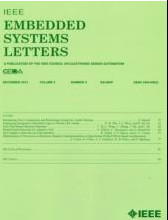 Auto-OPS: A Framework For Automated Optical Probing Simulation on GDS-II
Auto-OPS: A Framework For Automated Optical Probing Simulation on GDS-II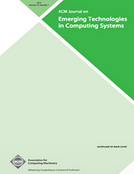 qSAT: Design of an Efficient Quantum Satisfiability Solver for Hardware Equivalence Checking
qSAT: Design of an Efficient Quantum Satisfiability Solver for Hardware Equivalence Checking Correct and Verify - CAV: Exploiting Binary Decision Diagrams to Enable Formal Verification of Approximate Adders with Correct Carry Bits
Correct and Verify - CAV: Exploiting Binary Decision Diagrams to Enable Formal Verification of Approximate Adders with Correct Carry Bits EnR: Extend and Reduce Methodology to Enable Formal Verification of Truncated Adders
EnR: Extend and Reduce Methodology to Enable Formal Verification of Truncated Adders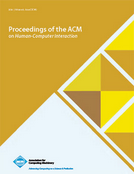 Determining the Effect of Feedback Quality on User Engagement on Online Idea Crowdsourcing Platforms Using an AI model | Proceedings of the ACM on Human-Computer Interaction
Determining the Effect of Feedback Quality on User Engagement on Online Idea Crowdsourcing Platforms Using an AI model | Proceedings of the ACM on Human-Computer Interaction Lower the RISC: Designing optical-probing-attack-resistant cores
Lower the RISC: Designing optical-probing-attack-resistant cores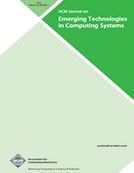 Exploiting the Extended Neighborhood of Hexagonal Qubit Architecture for Mapping Quantum Circuits
Exploiting the Extended Neighborhood of Hexagonal Qubit Architecture for Mapping Quantum Circuits OPTI-Sim: Performing Optical Probing Simulation on Layout Design Files
OPTI-Sim: Performing Optical Probing Simulation on Layout Design Files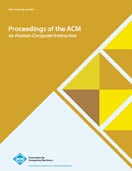 Determining the Effect of Feedback Quality on User Engagement on Idea Crowdsourcing Platforms using an AI model
Determining the Effect of Feedback Quality on User Engagement on Idea Crowdsourcing Platforms using an AI model veriSIMPLER : An Automated Formal Verification Methodology for SIMPLER MAGIC Design Style Based In-Memory Computing
veriSIMPLER : An Automated Formal Verification Methodology for SIMPLER MAGIC Design Style Based In-Memory Computing cecApprox: Enabling Automated Combinational Equivalence Checking for Approximate Circuits
cecApprox: Enabling Automated Combinational Equivalence Checking for Approximate Circuits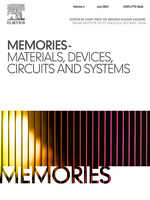 Trends and challenges in design of embedded BCH error correction codes in multi-levels NAND flash memory devices
Trends and challenges in design of embedded BCH error correction codes in multi-levels NAND flash memory devices Special issue on in-memory computing: Circuits, system, architecture and verification
Special issue on in-memory computing: Circuits, system, architecture and verification Should We Even Optimize for Execution Energy? Rethinking Mapping for MAGIC Design Style
Should We Even Optimize for Execution Energy? Rethinking Mapping for MAGIC Design Style Synergistic Verification of Hardware Peripherals through Virtual Prototype Aided Cross-Level Methodology Leveraging Coverage-Guided Fuzzing and Co-Simulation
Synergistic Verification of Hardware Peripherals through Virtual Prototype Aided Cross-Level Methodology Leveraging Coverage-Guided Fuzzing and Co-Simulation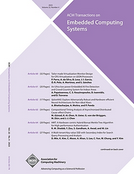 ReSG: A Data Structure for Verification of Majority based In-Memory Computing on ReRAM Crossbars
ReSG: A Data Structure for Verification of Majority based In-Memory Computing on ReRAM Crossbars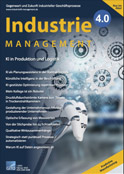 KI-gestützte Optimierung repetitiver Prozesse - Eine Kodierungstechnik für repetitive Prozesse in der evolutionären Optimierung
KI-gestützte Optimierung repetitiver Prozesse - Eine Kodierungstechnik für repetitive Prozesse in der evolutionären Optimierung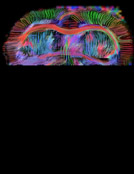 AI-Driven and Automated MRI Sequence Optimization in Scanner-Independent MRI Sequences Formulated by a Domain-Specific Language
AI-Driven and Automated MRI Sequence Optimization in Scanner-Independent MRI Sequences Formulated by a Domain-Specific Language Impact of Sneak Paths on In-Memory Logic Design in Memristive Crossbars Information Technology
Impact of Sneak Paths on In-Memory Logic Design in Memristive Crossbars Information Technology A Novel Default Risk Prediction and Feature Importance
Analysis Technique for Marketplace Lending using
Machine Learning
A Novel Default Risk Prediction and Feature Importance
Analysis Technique for Marketplace Lending using
Machine Learning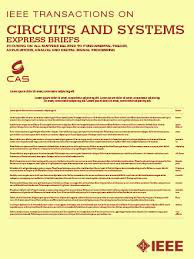 MARADIV: Library of MAGIC based Approximate Restoring Array Divider Benchmark Circuits for In-Memory Computing Using Memristors
MARADIV: Library of MAGIC based Approximate Restoring Array Divider Benchmark Circuits for In-Memory Computing Using Memristors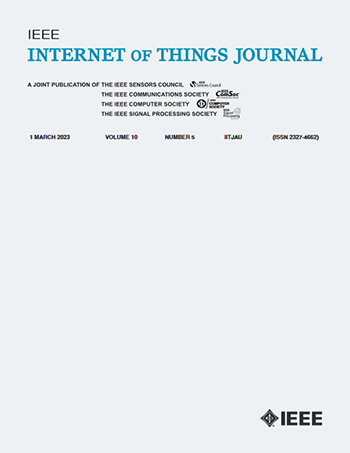 Specification-based Symbolic Execution for Stateful Network Protocol Implementations in the IoT
Specification-based Symbolic Execution for Stateful Network Protocol Implementations in the IoT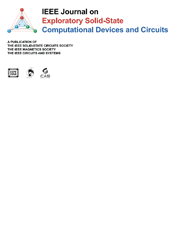 IMAGIN: Library of IMPLY and MAGIC NOR Based Approximate Adders for In-Memory Computing
IMAGIN: Library of IMPLY and MAGIC NOR Based Approximate Adders for In-Memory Computing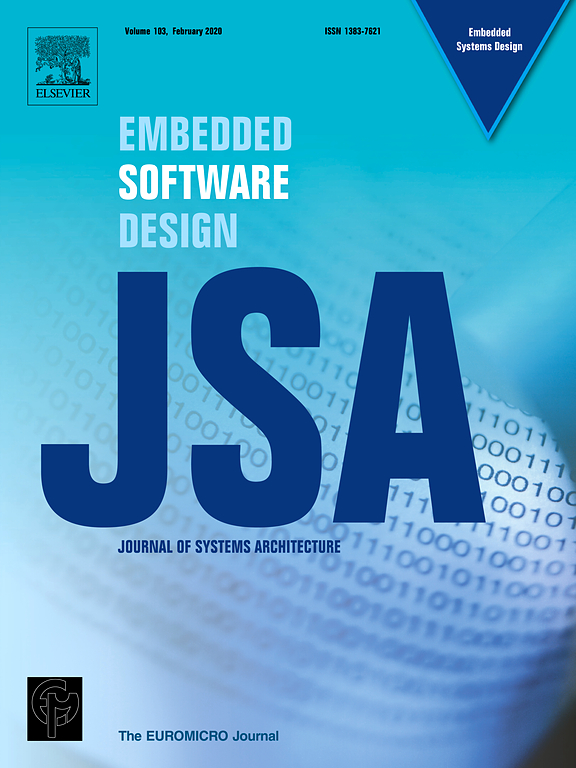 The MicroRV32 framework: An Accessible and Configurable Open Source RISC-V Cross-Level Platform for Education and Research
The MicroRV32 framework: An Accessible and Configurable Open Source RISC-V Cross-Level Platform for Education and Research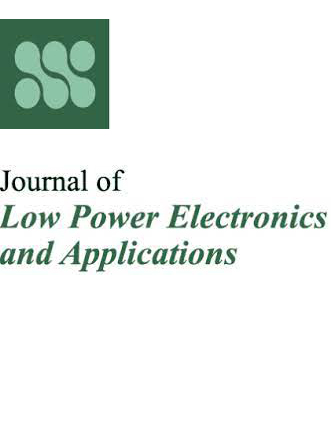 Advanced Embedded System Modeling and Simulation in an Open Source RISC-V Virtual Prototype
Advanced Embedded System Modeling and Simulation in an Open Source RISC-V Virtual Prototype Feed-Forward learning algorithm for resistive memories
Feed-Forward learning algorithm for resistive memories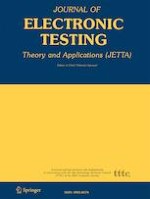 FAMCroNA: Fault Analysis in Memristive Crossbars for Neuromorphic Applications
FAMCroNA: Fault Analysis in Memristive Crossbars for Neuromorphic Applications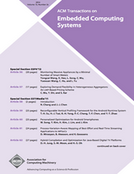 Early SoCs Information Flow Policies Validation using SystemC-based Virtual Prototypes at the ESL
Early SoCs Information Flow Policies Validation using SystemC-based Virtual Prototypes at the ESL Equivalence Checking of System-Level and SPICE-Level Models of Linear Circuits
Equivalence Checking of System-Level and SPICE-Level Models of Linear Circuits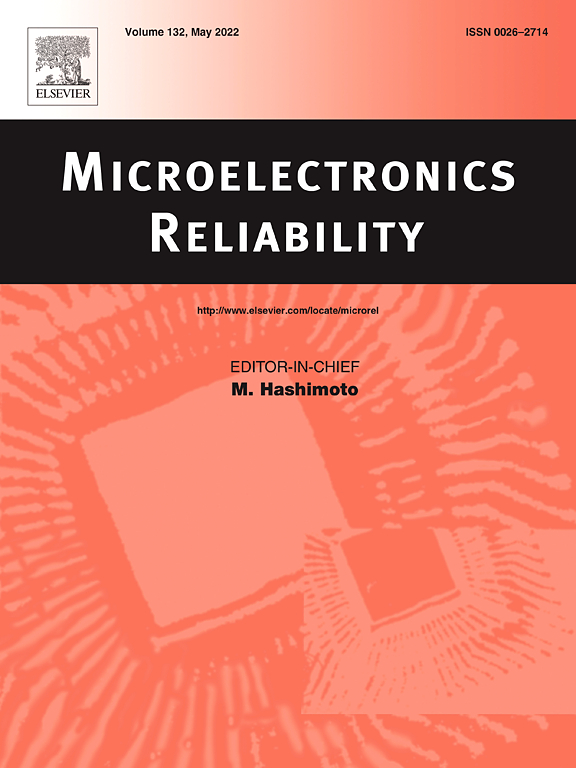 Power-aware Test Scheduling Framework for IEEE 1687 Multi-Power Domain Networks using Formal Techniques
Power-aware Test Scheduling Framework for IEEE 1687 Multi-Power Domain Networks using Formal Techniques Towards Quantification and Visualization of the Effects of Concretization during Concolic Testing
Towards Quantification and Visualization of the Effects of Concretization during Concolic Testing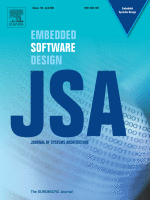 CoMIC: Complementary Memristor based in-memory computing in 3D architecture
CoMIC: Complementary Memristor based in-memory computing in 3D architecture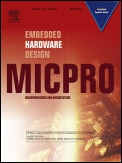 Template-based mapping of reversible circuits to IBM quantum computers
Template-based mapping of reversible circuits to IBM quantum computers SymEx-VP: An Open Source Virtual Prototype for OS-Agnostic Concolic Testing of IoT Firmware
SymEx-VP: An Open Source Virtual Prototype for OS-Agnostic Concolic Testing of IoT Firmware Unlocking Approximation for In-Memory Computing with Cartesian Genetic Programming and Computer Algebra for Arithmetic Circuits
Unlocking Approximation for In-Memory Computing with Cartesian Genetic Programming and Computer Algebra for Arithmetic Circuits Verzahnung von Data Stewardship und Data Science – Wege und Perspektiven
Verzahnung von Data Stewardship und Data Science – Wege und Perspektiven  Disziplinübergreifendes Modell zur Ausbildung von Forschungsdatenmanagement und Data Science Kompetenzen: „Data Train – Training in Research Data Management and Data Science“
Disziplinübergreifendes Modell zur Ausbildung von Forschungsdatenmanagement und Data Science Kompetenzen: „Data Train – Training in Research Data Management and Data Science“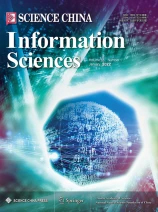 Advanced Virtual Prototyping for Cyber-Physical Systems using RISC-V: Implementation, Verification and Challenges
Advanced Virtual Prototyping for Cyber-Physical Systems using RISC-V: Implementation, Verification and Challenges RevSCA-2.0: SCA-based Formal Verification of Non-trivial Multipliers using Reverse Engineering and Local Vanishing Removal
RevSCA-2.0: SCA-based Formal Verification of Non-trivial Multipliers using Reverse Engineering and Local Vanishing Removal Towards RISC-V CSR Compliance Testing
Towards RISC-V CSR Compliance Testing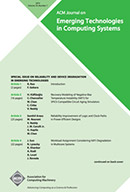 Parallel Computing of Graph-Based functions in ReRAM
Parallel Computing of Graph-Based functions in ReRAM An ant colony based mapping of quantum circuits to nearest neighbor architectures
An ant colony based mapping of quantum circuits to nearest neighbor architectures Adaptive Simulation with Virtual Prototypes in an Open-Source RISC-V Evaluation Platform
Adaptive Simulation with Virtual Prototypes in an Open-Source RISC-V Evaluation Platform Through the Looking Glass: Automated Design Understanding of SystemC-based VPs at the ESL
Through the Looking Glass: Automated Design Understanding of SystemC-based VPs at the ESL On the Difficulty of Inserting Trojans in Reversible Computing Architectures
On the Difficulty of Inserting Trojans in Reversible Computing Architectures An Improved Heuristic Technique for Nearest Neighbor Realization of Quantum Circuits in 2D Architecture
An Improved Heuristic Technique for Nearest Neighbor Realization of Quantum Circuits in 2D Architecture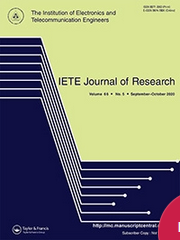 Improving the Designs of Nearest Neighbor Quantum Circuits for 1D and 2D Architectures
Improving the Designs of Nearest Neighbor Quantum Circuits for 1D and 2D Architectures ReCoFused partial reconfiguration for secure moving-target countermeasures on FPGAs
ReCoFused partial reconfiguration for secure moving-target countermeasures on FPGAs Advanced Exact Synthesis of Clifford+T Circuits
Advanced Exact Synthesis of Clifford+T Circuits
 Overcoming the Trade-off Between Accuracy and Compactness in Decision Diagrams for Quantum Computation
Overcoming the Trade-off Between Accuracy and Compactness in Decision Diagrams for Quantum Computation On the Impact of the Synchronization Constraint and Interconnections in Quantum-dot Cellular Automata
On the Impact of the Synchronization Constraint and Interconnections in Quantum-dot Cellular Automata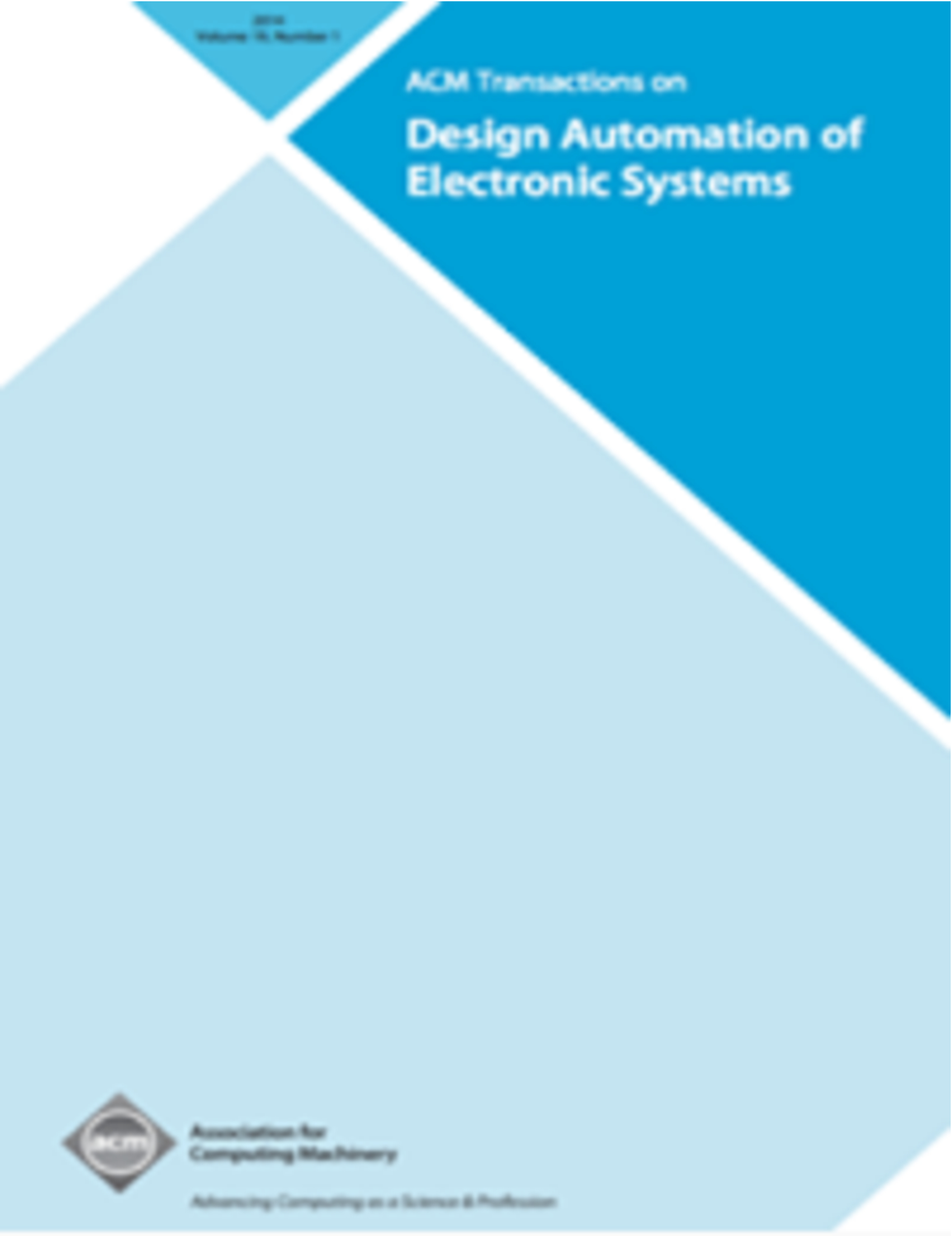 PREASC: Automatic Portion Resilience Evaluation for Approximating SystemC-based Designs using Regression Analysis Techniques
PREASC: Automatic Portion Resilience Evaluation for Approximating SystemC-based Designs using Regression Analysis Techniques RISC-V based Virtual Prototype: An Extensible and Configurable Platform for the System-level
RISC-V based Virtual Prototype: An Extensible and Configurable Platform for the System-level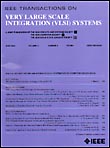 Reversible Circuits: IC/IP Piracy Attacksand Countermeasures
Reversible Circuits: IC/IP Piracy Attacksand Countermeasures Near Zero-Energy Computation Using Quantum-dot Cellular Automata
Near Zero-Energy Computation Using Quantum-dot Cellular Automata Placement & Routing for Tile-based Field-coupled Nanocomputing Circuits is NP-complete
Placement & Routing for Tile-based Field-coupled Nanocomputing Circuits is NP-complete Combining Sequentialization-based Verification of Multi-Threaded C Programs with Symbolic Partial Order Reduction
Combining Sequentialization-based Verification of Multi-Threaded C Programs with Symbolic Partial Order Reduction Security Validation of VP-based SoCs Using Dynamic Information Flow Tracking
Security Validation of VP-based SoCs Using Dynamic Information Flow Tracking Automated Non-intrusive Analysis of Electronic System Level Designs
Automated Non-intrusive Analysis of Electronic System Level Designs Determining Application-specific Knowledge for Improving Robustness of Sequential Circuits
Determining Application-specific Knowledge for Improving Robustness of Sequential Circuits The complexity of error metrics
The complexity of error metrics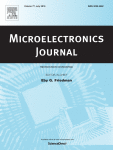 On the complexity of design tasks for Digital Microfluidic Biochips
On the complexity of design tasks for Digital Microfluidic Biochips Evaluation of (power) side-channels
in cryptographic implementations
Evaluation of (power) side-channels
in cryptographic implementations Arduinos in der Schule -
Lernen mit Mikrocontrollern
Arduinos in der Schule -
Lernen mit Mikrocontrollern Verifying SystemC using Intermediate Verification Language and Stateful Symbolic Simulation
Verifying SystemC using Intermediate Verification Language and Stateful Symbolic Simulation Logic synthesis for RRAM-based in-memory computing
Logic synthesis for RRAM-based in-memory computing Behaviour Driven Development for Hardware Design
Behaviour Driven Development for Hardware Design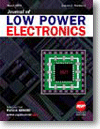 An Automated Approach for Generating and Checking Control Logic for Reversible Hardware Description Language-Based Designs
An Automated Approach for Generating and Checking Control Logic for Reversible Hardware Description Language-Based Designs An Energy-aware Model for the Logic Synthesis of Quantum-Dot Cellular Automata
An Energy-aware Model for the Logic Synthesis of Quantum-Dot Cellular Automata Frame Conditions in the Automatic Validation and Verification of UML/OCL Models: A Symbolic Formulation of modifies only Statements
Frame Conditions in the Automatic Validation and Verification of UML/OCL Models: A Symbolic Formulation of modifies only Statements  Synthesis of optical circuits using binary decision diagrams
Synthesis of optical circuits using binary decision diagrams A PLiM computer for the IoT
A PLiM computer for the IoT Towards a Verification Flow Across Abstraction Levels:
Towards a Verification Flow Across Abstraction Levels: metaSMT: Focus On Your Application And Not On Solver Integration
metaSMT: Focus On Your Application And Not On Solver Integration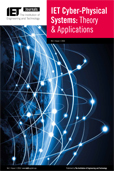 Verifying the Structure and Behavior in UML/OCL Models Using Satisfiability Solvers
Verifying the Structure and Behavior in UML/OCL Models Using Satisfiability Solvers Gates vs. Splitters: Contradictory Optimization Objectives in the Synthesis of Optical Circuits
Gates vs. Splitters: Contradictory Optimization Objectives in the Synthesis of Optical Circuits Reversible Synthesis of Symmetric Functions with a Simple Regular Structure and Easy Testability
Reversible Synthesis of Symmetric Functions with a Simple Regular Structure and Easy Testability On Optimization-based ATPG and its Application for Highly Compacted Test Sets
On Optimization-based ATPG and its Application for Highly Compacted Test Sets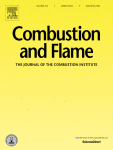 Time-resolved detection of diffusion limited temperature gradients inside single isolated burning droplets using Rainbow Refractometry
Time-resolved detection of diffusion limited temperature gradients inside single isolated burning droplets using Rainbow Refractometry Complexity of Reversible Circuits and their Quantum Implementations
Complexity of Reversible Circuits and their Quantum Implementations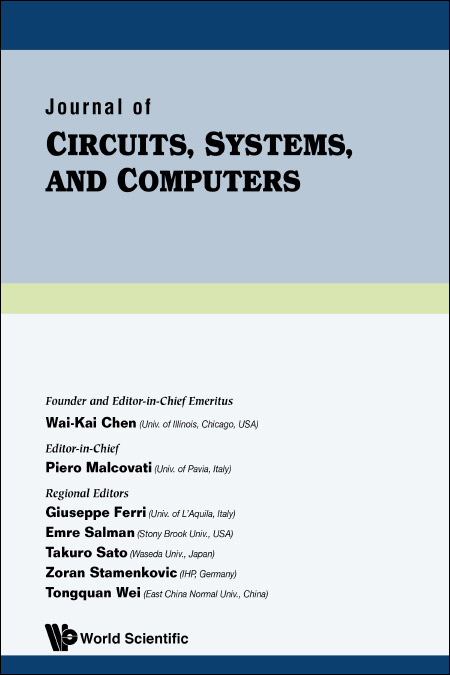 Analyzing Inconsistencies in UML/OCL Models
Analyzing Inconsistencies in UML/OCL Models KI-Unterstützung im Systementwurf –
Wenn Computer lernen, wie Computer
arbeiten
KI-Unterstützung im Systementwurf –
Wenn Computer lernen, wie Computer
arbeiten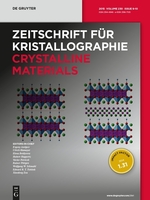 Atomic distributions in crystal structures solved by Boolean satisfiability techniques
Atomic distributions in crystal structures solved by Boolean satisfiability techniques SyReC: A Hardware Description Language for the Specification and Synthesis of Reversible Circuits
SyReC: A Hardware Description Language for the Specification and Synthesis of Reversible Circuits Analyzing SystemC Designs: SystemC Analysis Approaches for Varying Applications
Analyzing SystemC Designs: SystemC Analysis Approaches for Varying Applications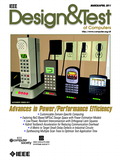 Scalable One-Pass Synthesis for Digital Microfluidic Biochips
Scalable One-Pass Synthesis for Digital Microfluidic Biochips
 QMDDs: Efficient Quantum Function Representation and Manipulation
QMDDs: Efficient Quantum Function Representation and Manipulation Embedding of Large Boolean Functions for Reversible Logic
Embedding of Large Boolean Functions for Reversible Logic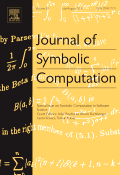 Ancilla-free synthesis of large reversible functions using binary decision diagrams
Ancilla-free synthesis of large reversible functions using binary decision diagrams Benefits of illustrations and videos for technical documentations
Benefits of illustrations and videos for technical documentations Incorporating User Preferences in Many-Objective Optimization using Relation epsilon-Preferred
Incorporating User Preferences in Many-Objective Optimization using Relation epsilon-Preferred Exact Reordering of Circuit Lines for Nearest Neighbor Quantum Architectures
Exact Reordering of Circuit Lines for Nearest Neighbor Quantum Architectures Improved Cube List Based Cube Pairing Approach for Synthesis of ESOP Based Reversible Logic
Improved Cube List Based Cube Pairing Approach for Synthesis of ESOP Based Reversible Logic An Approach to Reversible Logic Synthesis Using Input and Output Permutations
An Approach to Reversible Logic Synthesis Using Input and Output Permutations Special Issue on Reversible Computation
Special Issue on Reversible Computation An effective fault ordering heuristic for SAT-based dynamic test compaction techniques
An effective fault ordering heuristic for SAT-based dynamic test compaction techniques Testing integrated circuits
Testing integrated circuits Upper bounds for reversible circuits based on Young subgroups
Upper bounds for reversible circuits based on Young subgroups Formale Verifikation von UML-basierten Spezifikationen, Prüfung der Korrektheit von Systementwürfen vor deren Implementierung
Formale Verifikation von UML-basierten Spezifikationen, Prüfung der Korrektheit von Systementwürfen vor deren Implementierung Considering Nearest Neighbor Constraints of Quantum Circuits at the Reversible Circuit Level
Considering Nearest Neighbor Constraints of Quantum Circuits at the Reversible Circuit Level Quantum circuits employing roots of the Pauli matrices
Quantum circuits employing roots of the Pauli matrices Trading Off Circuit Lines and Gate Costs in the Synthesis of Reversible Logic
Trading Off Circuit Lines and Gate Costs in the Synthesis of Reversible Logic A Formal Model for Embedded Brain Reading
A Formal Model for Embedded Brain Reading
 Effect of Negative Control Lines on the Exact Synthesis of Reversible Circuits
Effect of Negative Control Lines on the Exact Synthesis of Reversible Circuits RevKit: An Open Source Toolkit for the Design of Reversible Circuits
RevKit: An Open Source Toolkit for the Design of Reversible Circuits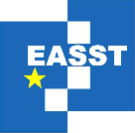 Enhanced Formal Verification Flow for Circuits Integrating Debugging and Coverage Analysis
Enhanced Formal Verification Flow for Circuits Integrating Debugging and Coverage Analysis Automatic TLM Fault Localization for SystemC
Automatic TLM Fault Localization for SystemC Special Issue on Reversible Computation
Special Issue on Reversible Computation RevKit: A Toolkit for Reversible Circuit Design
RevKit: A Toolkit for Reversible Circuit Design A Highly Fault-Efficient SAT-Based ATPG Flow
A Highly Fault-Efficient SAT-Based ATPG Flow Efficient Data Structures and Methodologies for SAT-based ATPG providing High Fault Coverage in Industrial Application
Efficient Data Structures and Methodologies for SAT-based ATPG providing High Fault Coverage in Industrial Application Effective Robustness Analysis using Bounded Model Checking Techniques
Effective Robustness Analysis using Bounded Model Checking Techniques Synthesis of Quantum Circuits for Linear Nearest Neighbor Architectures
Synthesis of Quantum Circuits for Linear Nearest Neighbor Architectures
 Debugging Reversible Circuits
Debugging Reversible Circuits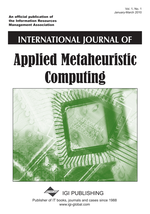 BDD-Based Synthesis of Reversible Logic
BDD-Based Synthesis of Reversible Logic 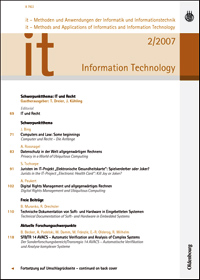 Automatische formale Verifikation der Fehlertoleranz von Schaltkreisen
Automatische formale Verifikation der Fehlertoleranz von Schaltkreisen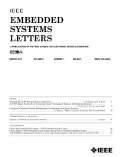 Towards Fully Automatic Synthesis of Embedded Software
Towards Fully Automatic Synthesis of Embedded Software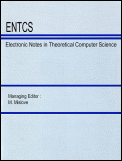 Effect of BDD Optimization on Synthesis of Reversible and Quantum Logic
Effect of BDD Optimization on Synthesis of Reversible and Quantum Logic Incremental Solving Techniques for SAT-based ATPG
Incremental Solving Techniques for SAT-based ATPG Synthese reversibler Logik
Synthese reversibler Logik MONSOON: SAT-based ATPG for Path Delay Faults Using Multiple-Valued Logics
MONSOON: SAT-based ATPG for Path Delay Faults Using Multiple-Valued Logics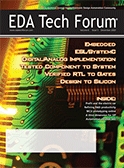 Overcoming the limitations of data introspection for SystemC
Overcoming the limitations of data introspection for SystemC Formale Verifikation von logistischen Prozessmodellen
Formale Verifikation von logistischen Prozessmodellen Weighted A* search - unifying view and application
Weighted A* search - unifying view and application Effiziente Erfüllbarkeitsalgorithmen für die Generierung von Testmustern
Effiziente Erfüllbarkeitsalgorithmen für die Generierung von Testmustern Exact Synthesis of Elementary Quantum Gate Circuits
Exact Synthesis of Elementary Quantum Gate Circuits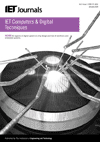 Advanced Verification by Automatic Property Generation
Advanced Verification by Automatic Property Generation Exact Multiple Control Toffoli Network Synthesis with SAT Techniques
Exact Multiple Control Toffoli Network Synthesis with SAT Techniques Modeling and Proving Completeness in Formal Verification of Counting Heads
Modeling and Proving Completeness in Formal Verification of Counting Heads On Acceleration of SAT-based ATPG for Industrial Designs
On Acceleration of SAT-based ATPG for Industrial Designs Improved SAT-based Reachability Analysis with Observability Don’t Cares
Improved SAT-based Reachability Analysis with Observability Don’t Cares On the Construction of Small Fully Testable Circuits with Low Depth
On the Construction of Small Fully Testable Circuits with Low Depth Logic Minimization and Testability of 2-SPP Networks
Logic Minimization and Testability of 2-SPP Networks Analyzing Functional Coverage in Bounded Model Checking
Analyzing Functional Coverage in Bounded Model Checking Automatic Fault Localization for Property Checking
Automatic Fault Localization for Property Checking
 BDD-based Verification of Scalable Designs
BDD-based Verification of Scalable Designs Building Free Binary Decision Diagrams Using SAT Solvers
Building Free Binary Decision Diagrams Using SAT Solvers An Integrated Approach for Combining BDDs and SAT Provers
An Integrated Approach for Combining BDDs and SAT Provers Technische Dokumentation von Soft- und Hardware in
eingebetteten Systemen
Technische Dokumentation von Soft- und Hardware in
eingebetteten Systemen Exact minimisation of path-related objective functions for binary decision diagrams
Exact minimisation of path-related objective functions for binary decision diagrams Testability of SPP Three-Level Logic Networks in Static Fault Models
Testability of SPP Three-Level Logic Networks in Static Fault Models
 The Effect of Improved Lower Bounds in Dynamic BDD Reordering
The Effect of Improved Lower Bounds in Dynamic BDD Reordering Minimizing the Number of Paths in BDDs
- Theory and Algorithm
Minimizing the Number of Paths in BDDs
- Theory and Algorithm
 Combining Ordered Best-First Search with Branch and Bound for Exact BDD Minimization
Combining Ordered Best-First Search with Branch and Bound for Exact BDD Minimization System Level Validation Using Formal Techniques
System Level Validation Using Formal Techniques Generic Implementation of Multi-Valued Decision Diagram Packages
Generic Implementation of Multi-Valued Decision Diagram Packages Project-Based Learning in Student Teams in Computer Science Education
Project-Based Learning in Student Teams in Computer Science Education Synthesis of Fully Testable Circuits from BDDs
Synthesis of Fully Testable Circuits from BDDs Methods for Construction of Recursive Algorithms for Reed-Mulle-Fourier Polarity Matrices Calculation
Methods for Construction of Recursive Algorithms for Reed-Mulle-Fourier Polarity Matrices Calculation Using Word-Level Information in Formal Hardware Verification
Using Word-Level Information in Formal Hardware Verification An Improved Branch and Bound Algorithm for Exact BDD Minimization
An Improved Branch and Bound Algorithm for Exact BDD Minimization Recursive Bi-Partitioning of Netlists for Large Number of Partitions
Recursive Bi-Partitioning of Netlists for Large Number of Partitions Ein Ansatz zur formalen Verifikation von Schaltungsbeschreibungen in SystemC
Ein Ansatz zur formalen Verifikation von Schaltungsbeschreibungen in SystemC Efficient Minimization and Manipulation of Linearly Transformed Binary Decision Diagrams
Efficient Minimization and Manipulation of Linearly Transformed Binary Decision Diagrams Exact Routing with Search Space Reduction
Exact Routing with Search Space Reduction Computer Architecture Core of Knowledge for Computer Science Studies
Computer Architecture Core of Knowledge for Computer Science Studies Polynomial Formal Verification of Multipliers
Polynomial Formal Verification of Multipliers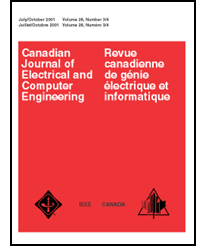 Low Power Optimization Techniques for BDD Mapped Circuits Using Temporal Correlation
Low Power Optimization Techniques for BDD Mapped Circuits Using Temporal Correlation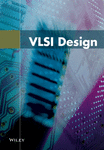 Efficient Algorithms for Creation of Linearly-independent Decision Diagrams and their Mapping to Regular Layouts
Efficient Algorithms for Creation of Linearly-independent Decision Diagrams and their Mapping to Regular Layouts Logic Circuit Equivalence Checking Using Haar Spectral Coefficients and Partial BDDs
Logic Circuit Equivalence Checking Using Haar Spectral Coefficients and Partial BDDs Minimization of Word-level Decision Diagrams
Minimization of Word-level Decision Diagrams Minimization of Free BDDs
Minimization of Free BDDs Verifying Integrity of Decision Diagrams
Verifying Integrity of Decision Diagrams Heuristic Learning based on Genetic Programming
Heuristic Learning based on Genetic Programming Dynamic Re-Encoding During MDD Minimization
Dynamic Re-Encoding During MDD Minimization History-based Dynamic BDD Minimization
History-based Dynamic BDD Minimization Äquivalenzvergleich digitaler Schaltungen im industriellen Umfeld
Äquivalenzvergleich digitaler Schaltungen im industriellen Umfeld Fault Simulation in Multi-Valued Logic Networks
Fault Simulation in Multi-Valued Logic Networks Binary Decision Diagrams in Theory and Practice
Binary Decision Diagrams in Theory and Practice Combining GAs and Symbolic Methods for High Quality Tests of Sequential Circuits
Combining GAs and Symbolic Methods for High Quality Tests of Sequential Circuits Decision Diagram Method for Calculation of Pruned Walsh Transform
Decision Diagram Method for Calculation of Pruned Walsh Transform Using Lower Bounds during Dynamic BDD Minimization
Using Lower Bounds during Dynamic BDD Minimization ACTion: Combining Logic Synthesis and Technology Mapping for MUX based FPGAs
ACTion: Combining Logic Synthesis and Technology Mapping for MUX based FPGAs EXOR transform of inputs to design efficient two-level AND/EXOR adders
EXOR transform of inputs to design efficient two-level AND/EXOR adders Boolean Function Representation and Spectral Characterization Using AND/OR Graphs
Boolean Function Representation and Spectral Characterization Using AND/OR Graphs Genetic Algorithm for Minimization of fixed polarity Reed-Muller expressions
Genetic Algorithm for Minimization of fixed polarity Reed-Muller expressions On the Computational Power of Linearly Transformed BDDs
On the Computational Power of Linearly Transformed BDDs Fast Exact Minimization of BDDs
Fast Exact Minimization of BDDs Pseudo Kronecker Expressions for Symmetric Functions
Pseudo Kronecker Expressions for Symmetric Functions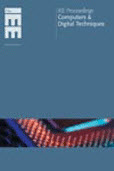 ETDD-based synthesis of two-dimensional cellular arrays for multi-output incompletely specified Boolean functions
ETDD-based synthesis of two-dimensional cellular arrays for multi-output incompletely specified Boolean functions
 OKFDD minimization by genetic algorithms with application to circuit design
OKFDD minimization by genetic algorithms with application to circuit design Testability of 2-Level AND/EXOR Circuits
Testability of 2-Level AND/EXOR Circuits BDD Minimization Using Symmetries
BDD Minimization Using Symmetries On Variable Ordering and Decomposition Type Choice in OKFDDs
On Variable Ordering and Decomposition Type Choice in OKFDDs